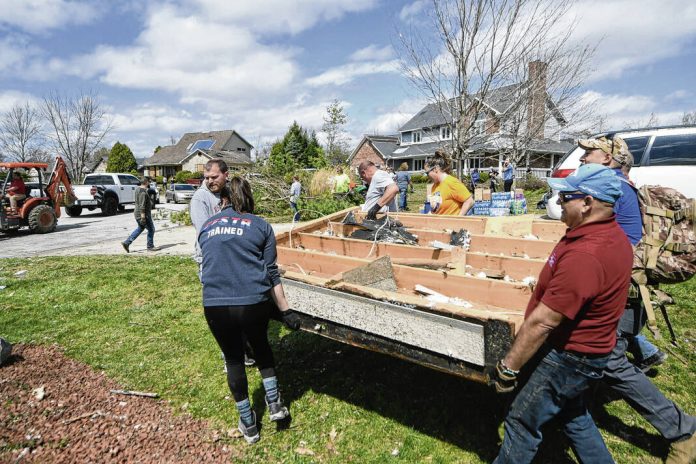A coalition made up of community members and organizations meant to fill in the gaps to help tornado victims is starting up in Whiteland.
A Long-Term Recovery Group, or LTRG, is meant to be a local-led group made up of several committees to help those affected by disasters in the long run. These groups are formed under the advisement of the National and Indiana Voluntary Organizations Active in Disaster, or VOAD.
Recovery starts and ends at the local level. The goal of LTRGs is to unite recovery resources with community unmet needs to ensure recovery.
Tornado survivors in Whiteland are currently navigating the process of dealing with insurance and applying for Federal Emergency Management Agency assistance and Small Business Administration loans. The long-term recovery group is meant to come in after affected residents go through those three steps, and fill in gaps where needs can’t be met by FEMA, insurance or SBA.
The group and its committees are not led by one organization or government entity. The group has eight committees, or teams, that meet different needs, all with checks and balances to ensure no one organization takes over power. Committees range from construction and financial help to spiritual and emotional help.
“It’s supposed to be like another one-stop shop,” said Carmen Young, Whiteland’s acting town manager and community development director.
Ross Stackhouse, pastor at HeavenEarth Church in Whiteland, volunteered to be the first temporary chair to get the group off the ground. The church has been very involved in helping Whiteland in its recovery and served as a donation distribution center for weeks after the tornado.
Three case managers were hired, who will work directly with residents on assessing and assisting with their needs related to disaster recovery. Stackhouse recruited these case managers based on recommendations, and people he knew who had backgrounds in social work that might be interested, he said.
Affected residents have to go through the first three steps insurance, FEMA and SBA, to then go to the recovery group for an unmet need.
“That doesn’t mean that ‘Oh, you didn’t apply for FEMA. We don’t care,’” Stackhouse said. “But, again, we were advised by experts. We’re just trying to implement a system that was given to us by people who do this all the time.”
Case managers are going to be the liaisons between residents and the different committees, who will help find resources to meet or recommend a resource for whatever unmet need a resident has.
“So say the unmet need is it’s emotional and spiritual care related, well, they can then make a referral. Say its monetary in nature, then there’s a whole process that we have to go through,” Stackhouse said.
A monetary need, for example, could be a resident who needs more money to fill in the rest of the cost of a roof replacement. That process would start with the case management committee to first determine if this person is eligible. Then it would go to an unmet needs roundtable, with different organizations at it who could help fill the need. If none of those organizations can fill the need, then the LTRG can step in and provide the funds. Funds the group can distribute would come from donations made to tornado relief for Whiteland.
The long-term recovery group is expected to last up to a year to provide help to affected residents as they recover. It’s a marathon, not a sprint, Stackhouse said. Some residents may need more help than others, and some may not need assistance now, but may later.
“The bulk of our work will be trying to just be a steady presence with folks as they’re navigating,” Stackhouse said.
The group in Whiteland is still getting off the ground, and initial calls to affected residents are being made now. Stackhouse intends to only serve as chair for the beginning because of his commitments to his job as pastor at HeavenEarth Church. He plans to find a replacement in the coming days before he steps back.
HOW TO GET HELP
Whiteland residents affected by the tornado who have unmet needs after going through insurance, FEMA and SBA can contact the local Long-Term Recovery Group.
Phone: 317-883-7102
Email: [email protected]





